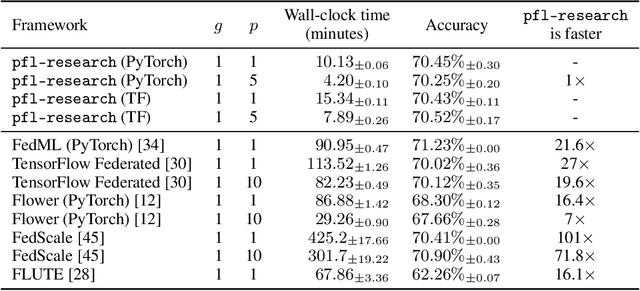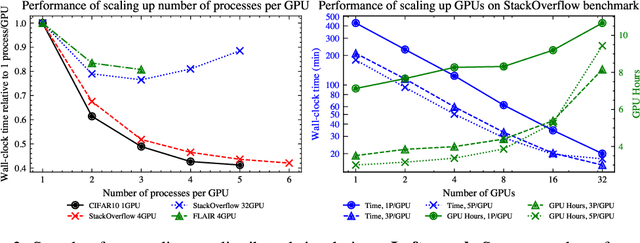Yi Sheng Chan
pfl-research: simulation framework for accelerating research in Private Federated Learning
Apr 09, 2024



Abstract:Federated learning (FL) is an emerging machine learning (ML) training paradigm where clients own their data and collaborate to train a global model, without revealing any data to the server and other participants. Researchers commonly perform experiments in a simulation environment to quickly iterate on ideas. However, existing open-source tools do not offer the efficiency required to simulate FL on larger and more realistic FL datasets. We introduce pfl-research, a fast, modular, and easy-to-use Python framework for simulating FL. It supports TensorFlow, PyTorch, and non-neural network models, and is tightly integrated with state-of-the-art privacy algorithms. We study the speed of open-source FL frameworks and show that pfl-research is 7-72$\times$ faster than alternative open-source frameworks on common cross-device setups. Such speedup will significantly boost the productivity of the FL research community and enable testing hypotheses on realistic FL datasets that were previously too resource intensive. We release a suite of benchmarks that evaluates an algorithm's overall performance on a diverse set of realistic scenarios. The code is available on GitHub at https://github.com/apple/pfl-research.
Samplable Anonymous Aggregation for Private Federated Data Analysis
Jul 27, 2023Abstract:We revisit the problem of designing scalable protocols for private statistics and private federated learning when each device holds its private data. Our first contribution is to propose a simple primitive that allows for efficient implementation of several commonly used algorithms, and allows for privacy accounting that is close to that in the central setting without requiring the strong trust assumptions it entails. Second, we propose a system architecture that implements this primitive and perform a security analysis of the proposed system.
 Add to Chrome
Add to Chrome Add to Firefox
Add to Firefox Add to Edge
Add to Edge